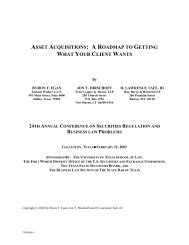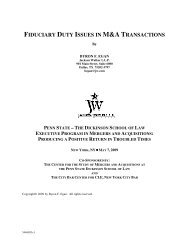Early Termination and Liquidation Provisions in Energy Trading and ...
Early Termination and Liquidation Provisions in Energy Trading and ...
Early Termination and Liquidation Provisions in Energy Trading and ...
Create successful ePaper yourself
Turn your PDF publications into a flip-book with our unique Google optimized e-Paper software.
1 3147494v18Examples of commonly used st<strong>and</strong>ardized master agreements <strong>in</strong>clude the ISDA (International Swap DealersAssociation, Inc., Master Agreement), NAESB (North American <strong>Energy</strong> St<strong>and</strong>ards Board Base Contract for Sale<strong>and</strong> Purchase of Natural Gas), GISB (Gas Industry St<strong>and</strong>ards Board Base Contract for Short-Term Sale <strong>and</strong>Purchase of Natural Gas), EEI (Edison Electric Institute Master Power Purchase <strong>and</strong> Sale Agreement), GasEDI(GasEDI Base Contract for Short-Term Sale <strong>and</strong> Purchase of Natural Gas), <strong>and</strong> WSPP (Western Systems PowerPool Agreement).2 In re Enron Corp., No. 01-16034 (Bankr. S.D.N.Y. Dec. 2, 2001).3 E.g. , Susan Kellogg, Aquila Quits <strong>Energy</strong> -Trad<strong>in</strong>g Bus<strong>in</strong>ess, available athttp://www.energy<strong>in</strong>fosource.com/commentary/article.cfm?articleID=86 (last visited October 2, 2002).4 While most master agreements conta<strong>in</strong> liquidated damages provisions, the ISDA lacks a liquidated damagesprovision because the ISDA does not contemplate physical delivery.5 See U.C.C. § 2-712. See also JOHN D. CALAMARI & JOSEPH M. PERILLO, THE LAW OF CONTRACTS § 14.20, at570 <strong>and</strong> n.2 (4 th ed. 1998). See, e.g., EEI § 4, at 13, GISB § 3, at 4, NAESB § 3, at 4, GasEDI § 3, at 6.6 See Texas Bus<strong>in</strong>ess <strong>and</strong> Commerce Code § 2.713.7 Id. See, e.g., GISB § 3.2, at 4, NAESB § 4.3, at 5, GasEDI § 3.2, at 6. Spot prices usually refer to <strong>in</strong>dustrypublications such as Gas Daily or Megawatt Daily, but any objective price reporter can be used.8 Id.9 See User’s Guide to the 1992 ISDA Master Agreements, § II.F.10 See International Swaps <strong>and</strong> Derivatives Association, Inc., Who we are - Mission, athttp://www.isda.org/wwa/<strong>in</strong>dex.html (last visited August 25, 2002). The need for a st<strong>and</strong>ard swap agreement aroseprior to the deregulation of the United States energy markets. The result was the formation of the InternationalSwap Dealers Association (“ISDA”) <strong>in</strong> 1984. ISDA is a trade association composed of dealers <strong>and</strong> marketparticipants engaged <strong>in</strong> transactions <strong>in</strong> the OTC derivative markets. ISDA produces st<strong>and</strong>ard form documentationfor privately negotiated derivative contracts with terms specifically tailored to the specific needs of the parties.ISDA currently produces the follow<strong>in</strong>g documents: (i) the 2000 ISDA Def<strong>in</strong>itions; (ii) the 1992 Master Agreement;(iii) the User’s Guide to the 1992 Master Agreement, drafted <strong>in</strong> 1993, expla<strong>in</strong><strong>in</strong>g <strong>in</strong> detail each section of the 1992Master Agreement; (iv) the Commodities Derivatives Def<strong>in</strong>itions, drafted <strong>in</strong> 1993 <strong>and</strong> supplemented <strong>in</strong> 2000; <strong>and</strong>(v) the Annex, provid<strong>in</strong>g for collateral documentation, f<strong>in</strong>alized <strong>in</strong> 1994, followed by its User’s Guide <strong>in</strong> 1995.11 See User’s Guide to the 1992 ISDA Master Agreements, International Swap Dealers Association, Inc., 1993Edition, § I.B.2., p.8.12 E.g. , the GISB lacks early term<strong>in</strong>ation <strong>and</strong> liquidation provisions unless parties agree to add such provisions asspecial provisions, while the EEI conta<strong>in</strong>s the provisions <strong>in</strong> its st<strong>and</strong>ard form.13 E.g. , a failure to make payment under the EEI <strong>and</strong> ISDA does not become an event of default unless such failureto pay cont<strong>in</strong>ues for three bus<strong>in</strong>ess day after the other party provides notice of such failure. Under the NAESB,failure to make payment on or before the second bus<strong>in</strong>ess day follow<strong>in</strong>g written notice constitutes an event ofdefault.14 See ISDA § 5(b). Although term<strong>in</strong>ation events per se are only found <strong>in</strong> the ISDA, analogous provisions are oftennegotiated <strong>in</strong>to other master agreements to address the same issues as those addressed <strong>in</strong> the ISDA.15 Id.16 See User’s Guide to the 1992 ISDA Master Agreements, § I.F.3.17 See ISDA § 6(b).18 See ISDA § 5(b).19 See, e.g., EEI § 5.2 <strong>and</strong> ISDA § 6(a).20 Any such agreement would likely relate to performance assurance <strong>and</strong>/or other agreements between the parties<strong>and</strong>/or their affiliates. This is often the case when the other contracts lack early term<strong>in</strong>ation <strong>and</strong> liquidation rights<strong>and</strong> the non-default<strong>in</strong>g party is exposed to the default<strong>in</strong>g party under these other agreements.21 See § 10.1 of the NAESB, § 2.1 of the GasEDI, § 5.1 of the EEI, § 5(a) of the ISDA, Paragraph 7 of the ISDACredit Support Annex.22 See ISDA § 5(b).23 See ISDA § 5(a)(vi).24 E.g., Enron filed for bankruptcy on December 2, 2001, <strong>and</strong> the total amount of its payment defaults is still unclearas of November 1, 2002, as are the precise amounts of its payment defaults to <strong>in</strong>dividual counterparties.25 Some master agreements place a cap on the maximum amount of time that may elapse between the notice of anevent of default <strong>and</strong> the early term<strong>in</strong>ation date. See, e.g., EEI § 5.2 <strong>and</strong> ISDA § 6(a).26 Id.15
















